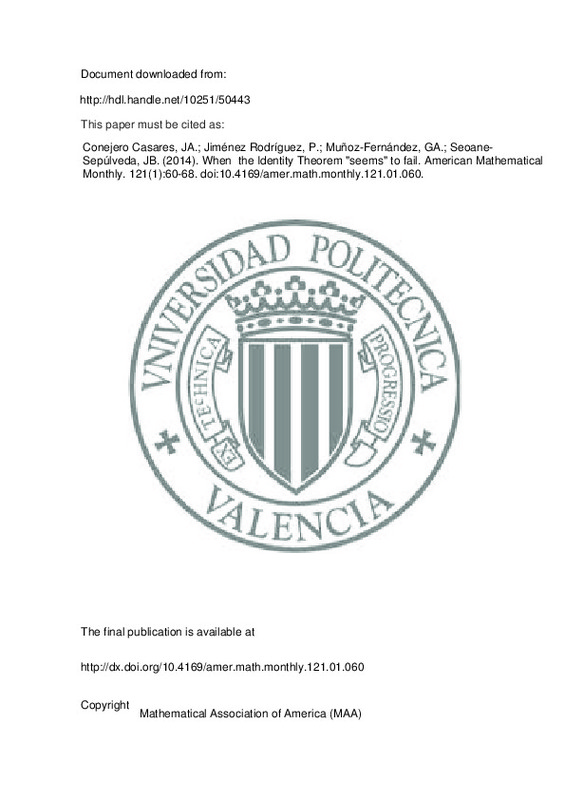JavaScript is disabled for your browser. Some features of this site may not work without it.
Buscar en RiuNet
Listar
Mi cuenta
Estadísticas
Ayuda RiuNet
Admin. UPV
When the Identity Theorem "seems" to fail
Mostrar el registro sencillo del ítem
Ficheros en el ítem
| dc.contributor.author | Conejero Casares, José Alberto
|
es_ES |
| dc.contributor.author | Jiménez Rodríguez, Pablo
|
es_ES |
| dc.contributor.author | Muñoz-Fernández, Gustavo A.
|
es_ES |
| dc.contributor.author | Seoane-Sepúlveda, Juan B.
|
es_ES |
| dc.date.accessioned | 2015-05-19T09:14:24Z | |
| dc.date.available | 2015-05-19T09:14:24Z | |
| dc.date.issued | 2014-01 | |
| dc.identifier.issn | 0002-9890 | |
| dc.identifier.uri | http://hdl.handle.net/10251/50443 | |
| dc.description.abstract | The Identity Theorem states that an analytic function (real or complex) on a connected domain is uniquely determined by its values on a sequence of distinct points that converge to a point of its domain. This result is not true in general in the real setting if we relax the analyticity hypothesis on the function to infinitely many times differentiability. In fact, we construct an algebra of functions A enjoying the following properties: (i) A is uncountably infinitely generated (that is, the cardinality of a minimal system of generators of A is c), (ii) every nonzero element of A is nowhere analytic, (iii) A ⊂ C∞(R), (iv) every element of A has infinitely many zeroes in R, and (v) for every f ∈ A and n ∈ N, f (n) (the n-th derivative of f) enjoys the same properties as the elements in A\{0}. This construction complements those made by Cater and Kim & Kwon, and published in the American Mathematical Monthly in 1984 and 2000, respectively | es_ES |
| dc.description.sponsorship | The authors would like to thank the referees for their insightful comments and remarks, especially for pointing out references [4, 14] and for their help in improving Theorem 2.3. They would also like to thank Profs. Bastin, Esser, and Nikolay for sharing their latest preprint [4]. The first, second, and fourth authors were supported by grants MTM2009-07848 and MTM2010-14909. The second named author's research was performed during the completion of his Master's Thesis at the Universidad Complutense de Madrid (Spain) in 2011/2012. | en_EN |
| dc.language | Inglés | es_ES |
| dc.publisher | Mathematical Association of America (MAA) | es_ES |
| dc.relation.ispartof | American Mathematical Monthly | es_ES |
| dc.rights | Reserva de todos los derechos | es_ES |
| dc.subject | Lineability | es_ES |
| dc.subject | Spaceability | es_ES |
| dc.subject | Algebrability | es_ES |
| dc.subject | Analytic function | es_ES |
| dc.subject | Identity theorem | es_ES |
| dc.subject | Annulling function | es_ES |
| dc.subject.classification | MATEMATICA APLICADA | es_ES |
| dc.title | When the Identity Theorem "seems" to fail | es_ES |
| dc.type | Artículo | es_ES |
| dc.identifier.doi | 10.4169/amer.math.monthly.121.01.060 | |
| dc.relation.projectID | info:eu-repo/grantAgreement/MICINN//MTM2009-07848/ES/Analisis Funcional No-Lineal Y Geometrico/ / | es_ES |
| dc.relation.projectID | info:eu-repo/grantAgreement/MICINN//MTM2010-14909/ES/HIPERCICLICIDAD Y CAOS DE OPERADORES/ | es_ES |
| dc.rights.accessRights | Abierto | es_ES |
| dc.contributor.affiliation | Universitat Politècnica de València. Departamento de Matemática Aplicada - Departament de Matemàtica Aplicada | es_ES |
| dc.description.bibliographicCitation | Conejero Casares, JA.; Jiménez Rodríguez, P.; Muñoz-Fernández, GA.; Seoane-Sepúlveda, JB. (2014). When the Identity Theorem "seems" to fail. American Mathematical Monthly. 121(1):60-68. doi:10.4169/amer.math.monthly.121.01.060 | es_ES |
| dc.description.accrualMethod | S | es_ES |
| dc.relation.publisherversion | http://dx.doi.org/10.4169/amer.math.monthly.121.01.060 | es_ES |
| dc.description.upvformatpinicio | 60 | es_ES |
| dc.description.upvformatpfin | 68 | es_ES |
| dc.type.version | info:eu-repo/semantics/publishedVersion | es_ES |
| dc.description.volume | 121 | es_ES |
| dc.description.issue | 1 | es_ES |
| dc.relation.senia | 281502 | |
| dc.contributor.funder | Ministerio de Ciencia e Innovación | es_ES |







![[Cerrado]](/themes/UPV/images/candado.png)

